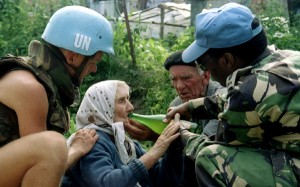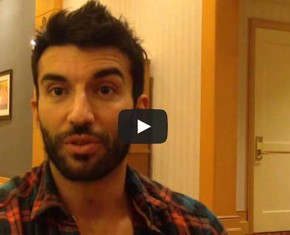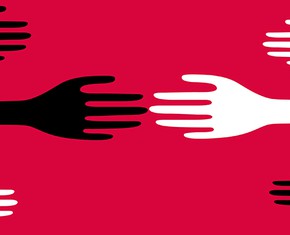The views expressed in our content reflect individual perspectives and do not represent the authoritative views of the Baha'i Faith.
The well-being of mankind, its peace and security, are unattainable unless and until its unity is firmly established. – Baha’u’llah, Gleanings from the Writings of Baha’u’llah, p. 286.
Baha’u’llah taught that an equal standard of human rights must be recognized and adopted. In the estimation of God all men are equal; there is no distinction or preferment for any soul in the dominion of His justice and equity. – Abdu’l-Baha, The Promulgation of Universal Peace, p. 181.
(The following article is adapted from the keynote speech of Professor Payam Akhavan at the Opening Ceremony of the McGill University Model United Nations on 22 January 2015, in Montreal, Canada.)
Much has changed in the world since during the past decade, but what remains the same is the vital importance of the United Nations, and the imperative necessity of a global forum where world leaders can deliberate, practice diplomacy and find solutions for the serious challenges confronting humankind.
Winston Churchill famously said that “diplomacy is the art of telling people to go to hell in such a way that they ask for directions.” The American celebrity Will Rogers put it differently in the 1930s: “Diplomacy” he said “is the art of saying ‘Nice doggie’ until you can find a rock.”
However we choose to define diplomacy, we can all agree that debate and dialogue are preferable to war and violence.
Today, the world we witness reflects its leadership, or rather, the failure of its leadership. Hatred, war, terrorism, genocide, greed, poverty, disease, hunger, the poisoning of our planet, all these afflictions, all these causes of human suffering, they are merely a mirror reflecting the choices made by those that wield power.
I began my career with the United Nations while still in my twenties. Going from the university to a war zone was a rude awakening. It is one thing to talk about ideals in the classroom, and yet another to see the reality of human suffering. I had graduated from Harvard Law School confident that I had all the answers. I believed in the mission of the UN. I believed in human rights. I knew everything there was to know about international law.

With the outbreak of the Yugoslav war in 1991, I was among the first on the ground. I was an idealistic human rights investigator, ready to bear witness to the horrors of “ethnic cleansing” and genocide. I remember the excitement of putting on my blue United Nations helmet for the first time, of flying the white UN helicopters and cargo planes to Vukovar and Sarajevo, of dodging bombs and bullets and living on the edge. But none of my academic qualifications, no amount of professional self-confidence, had prepared me for the horrible scenes that I would witness in the years that followed.
I saw beautiful cities reduced to rubble, homeless families wandering in the winter cold in search of food and shelter, the unspeakable pain of the survivors of rape and torture in the concentration camps, and of course, the unforgettable images of weeping mothers looking for their children in mass graves. It was a profoundly humbling experience, to go from theoretical learning and professional ambition, to feeling the intimate reality of those the UN was built to protect. And then to go from the Bosnian villages where I saw families that had been burnt alive, to the meetings of the UN Human Rights Council in Geneva, where diplomatic euphemism and carefully worded resolutions sanitized unpleasant realities and created the illusion of progress.
The worst was in 1994 when, despite repeated warnings that a genocide was about to happen, the world abandoned the people of Rwanda. Instead of protecting civilians, the UN withdrew its peacekeepers, knowing the terrible fate that awaited those left behind. While diplomats justified their cynical policies with sophisticated terminology, almost a million civilians were exterminated.
My dear friend Esther Mujawayo panicked as news arrived that many of her loved ones had been murdered. Without anyone to help her, she began running frantically through Kigali, to see how she could save the lives of her three little girls. She saw European soldiers who had been sent to evacuate the expatriates, and their pets. She saw them picking up dogs and cats and placing them in the army trucks that would take the diplomats and aid workers to the airport where they would fly to Europe.
In a moment of utter desperation, she gave her infant daughter to one of the soldiers. She begged him to take her little girl to Europe and place her for adoption with a good family. It was the act of a desperate mother, trying to save at least one of her children against the prospect of impending death.
The soldier refused to take her little girl. He explained that he was under instructions to only evacuate expatriates. As Esther told this story, her eyes filled with tears, and she said: “The life of a European dog was more important than the life of my little girl.”
There is something so vivid, so stark, in the contrast between Esther’s story, and the empty deliberations and resolutions the UN was adopting at the time. It makes a mockery of smug leaders that remember the Holocaust and say “never again”, while allowing such radical evil to unfold before our very eyes. Only when we have this intimate glimpse of suffering can we begin to appreciate the meaning of true leadership. Only after we understand the contrast between declarations of lofty principles among the powerful, and the grim reality of the downtrodden, can we can begin to have an honest conversation about the future of the UN and the promise of world governance.
We cannot reduce human suffering to statistics, solemn statements, and superficial sentimentality. Victims are not statistics. Behind every victim, there is a name. Behind every victim, there is a story. There is a mother and father, a brother and sister, a best friend and work colleague. Behind every victim is a universe of emotions and relations, ripped apart by violence, forever destroyed.
When we sit and deliberate on world problems in the corridors of power, and we talk about those problems in antiseptic politically correct language, and legalistic terminology, and bureaucratic procedures, we create a self-contained universe. We blind ourselves to the contradiction between our virtuous self-image, and our lack of commitment; the contradiction between our willingness to pay lip-service to morality, and our unwillingness to pay a price for it.
You May Also Like
Comments

















You say from a position of leadership yourself Payam: “The world we witness reflects the failure of its leadership.” More accurately i m o one should say: “the world we witness reflects the failings of its leaders, Baha’is included”; this pusillanimous soul would add for his own protection: “it’s not necessarily our leaders’ fault.” Perhaps certain Baha’is of capacity and influence are simply unaware of their duty as individual believers viz.
In excess of 25 years in circumstances tantamount to propagation-deceleration the Bahá'í International Community (BIC) conducts virtually no consultation on Esperanto and the Bahá'í Teachings; worse ...yet, the BIC rarely presents a paper or promotes consultation on the principle of a universal auxiliary language, whatever language is eventually chosen, or on the divine benefits surrounding its implementation, i.e. (1) making world peace real (2) harmonizing of inimical religions (3) teaching the Faith; again, not necessarily the selection question at this time.
Given in all matters that consultation is incumbent upon all followers of Bahá’u’lláh how much more important it is vis-à-vis an eternal principle of the Faith vitally linked to its dissemination! This last claim is amply proved in the Writings. Let’s be crystal clear Payam as to what’s at stake here whether the Bahá’í congregation is stuck, stagnating, stable or swelling: those who purposefully retard or merely shun consultation - itself a fundamental principle of the Faith as explained in chapter xii of Shoghi Effendi's tour de force God Passes By – in regard to another fundamental principle of the Faith are demonstrably in breach of the Covenant. All of the principles are obligatory! “Observe every ordinance of Him Who is the Desire of the world” constitutes the crux of Bahá’u’lláh’s opening paragraph of the Kitáb-i-Aqdas, His Book of Laws and the Mother Book of the Bahá’í Dispensation.
Again, for my part, none of the above criticizes Baha'i institutions per se because the Universal House of Justice as an institution is perfect and so are its elucidations regarding Esperanto as with every other subject. Some Baha'is are simply and demonstrably in error when they rule out criticism as a valid modus operandi vis-à-vis inactions of our leaders, provided I'm not maliciously designing to damage the reputation of named individuals.
On leadership and the qualities required of Bahá’í leaders: please open the superb web site below and address the bounden duty of all avowed vote-casting believers to fully engage the Bahá’í community and its institutional process. Consider too the ramifications of inactivity, disengagement and not appraising for yourself the qualities of our leaders. (By the way, my health issues and commitments render me unavailable for any leadership role, full stop. Clearly, then, I personally, seek no leadership role) On nullifying the last mentioned trio of negatives: consultation on the principle itself or the provisional utilization among Bahá’ís of a trial universal auxiliary language in one wealthy region or the mere studying of Esperanto in a lesser role, as time and again urged by ‘Abdu’l-Bahá repeatedly and emphatically, is an historic accomplishment to look forward to in a loving community which is far from divided though it remains for all to see and to hear - split down linguistic lines in excess of a century.
http://susangammage.com/leadership-in-the-bahai-faith
Baha'i love.
Paul.
Australia.
Things are so bad and so desperate that it’s time for hard talk. Have you noticed recently in what contempt the media by and large holds many of the leaders of the big religions? Since the civil war in Sri Lanka even peaceable Buddhism can’t escape its censure. What the leaders of religion do and fail to do leads directly to mega suffering: “Leaders of religion, in every age, have hindered their people from attaining the shores of eternal salvation, inasmuch as they held the reins of authority in their mighty grasp. Some for the lust of leadership, ...others through want of knowledge and understanding, have been the cause of the deprivation of the people.” Bahá’u’lláh, Kitab-i-Iqan, i.e. The Book of Certitude
From Baha’i history’s outset in the time of Mirza Yaya into the Guardianship era when Mason Remey et al broke the Covenant and then on into the 21st century when more pseudo Guardians appeared it’s the same old alpha males in sheep’s clothing wreaking havoc. We know history won’t repeat forever because God’s cure in an institutional sense is finally in place now in the supreme Body of the Universal House of Justice; this time around, praise be to God, we see perfection in one institution but what’s to be done when individual leaders - who in our unique Baha’i system possess no more power (influence is another subject!) or piety necessarily than any other believer - demonstrably are in breach of the Covenant whether wittingly or unwittingly? It’s the duty of the grass roots believer to set them right, at times forcibly and at times in words as mild as milk. No other religion in the history of the world encourages a non-entity like this amateur to air such challenging words and then challenges one’s coreligionists thus: Those who seek to repudiate me, the Bab has promised, must produce proofs like unto mine otherwise neither my words will cease nor the proofs I have set forth will become void.
The efforts of diplomats who smooth the path leading to meetings between world leaders are not discounted in ‘Abdu’l-Bahá’s text above nor is the importance of the international organizations established by nation states. He primarily alludes, I feel, to the outcomes of diplomacy at Versailles, June, 1919, between the Allied and Associated powers with the Central powers of World War 1. Illustrating impotent diplomacy at its worst the one-sided, excoriating and retributive structure and terms of similarly failed treaties of the era sowed seeds of conflict that endure into the time of the UN: Auschwitz, Sarajevo, Rwanda etcetera, etcetera down the ages, to which Payam so poignantly refers, will continue on and on until the public sees leaders actually practising the only cure. The wider world largely ignores the counsels of Baha’u’llah and the Baha’i world hardly consults on the only cure which “will unfailingly and alone secure the undoubted triumph of this sacred Cause.”